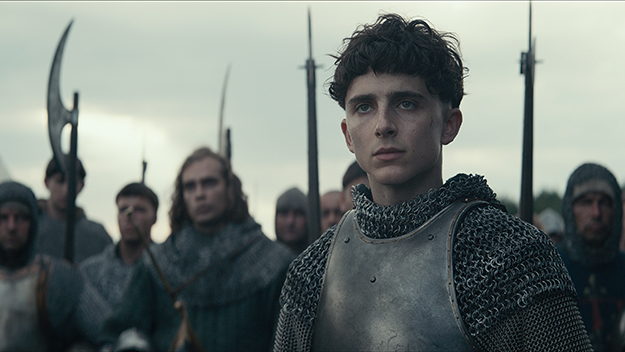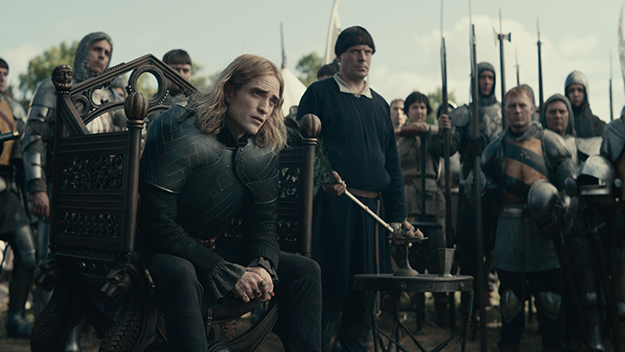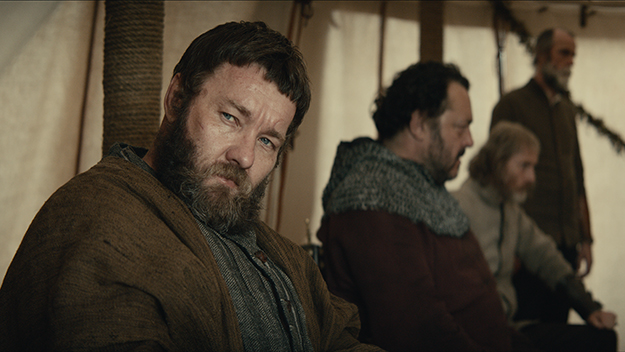Deep Focus: The King

Images from The King (David Michôd, 2019)
Shouldn’t a revisionist take on classic characters make them more captivating or surprising? Either that wasn’t the goal of co-writers David Michôd and Joel Edgerton when they rewrote the Henry V story for Michôd’s period epic, The King, or they tried to meet it and stumbled. Without appropriating the Bard’s poetry and prose, the movie follows Shakespeare’s general outlines as it opens in the early 15th century. Black sheep Prince Hal once again devotes himself to hijinks with the wastrel knight Sir John Falstaff (Joel Edgerton) while his ailing father King Henry IV (Ben Mendelsohn) crumbles under the weight of his failure to unite the squabbling regions and factions within his kingdom. And in this retelling, too, Hal emerges as a formidable leader after his father dies and he is crowned Henry V.
But the movie tosses away Shakespeare’s genius stroke of having Hal in his roustabout days signal that he’s waiting for just the right moment to reveal his own kind of noble nature: “Yet herein will I imitate the sun, / Who doth permit the base contagious clouds / To smother up his beauty from the world, / That when he please again to be himself, / Being wanted, he may be more wonder’d at.” Without that splash of cunning and intrigue—and with Timothée Chalamet playing Hal as an emo princeling disgusted by, but not immune to, toxic masculinity of the royal sort—the movie caters to the Zeitgeist rather than renew a thrice-told tale with verve and imagination. It’s a pandering-to-youth adaptation that portrays Hal, like Howard the Duck, “trapped in a world he never made.” (And the cast trapped in an egg they never laid.)
This movie means to turn Prince Hal into a wannabe pacifist who can’t live up to his own standards. In Chalamet’s playing he comes off as a quasi-charismatic mope. Ironically, he approaches inspiration only when he engages in single-warrior combat with this film’s Hotspur (Tom Glynn-Carney, who plays most of his scenes at one fever pitch), or when he leads his plucky army against the armored knights of a particularly campy Dauphin. (Robert Pattinson, as the Dauphin, challenges Chalamet to a thespian duel: which heartthrob can out-fey the other in portraying a bold warrior of the Middle Ages? Pattinson wins by a smirk.) Hal’s ultimate hope of redemption comes from marrying Catherine of Valois (Lily Rose-Depp) and demanding nothing more of her than she be truthful to him.

Even the movie’s isolated successes, like Edgerton’s stripped-down conception of Falstaff, simplify rather than deepen the material. In one of several nods to Orson Welles’s Chimes at Midnight (aka Falstaff), Falstaff becomes the moral center of the movie and the fictional figure stringing together bits of history and scraps of storylines from Shakespeare’s Henry IV Part I and II and Henry V. (This film’s Battle of Agincourt at times resembles Welles’s Battle of Shrewsbury.) But Welles’s Falstaff manages to be chaos personified as well as a good man. He embodies human appetites in all their volatility and silliness while positioning them, for Hal, as counterpoints to the life-denying codes of royal courts and battlefields.
In the writing and the playing, Edgerton’s conventionally lovable Falstaff is like a familiar variation on Robin Hood’s Friar Tuck. His sensual drives, his robust physicality, and his anti-authoritarian temperament neatly complement each other. He’s more than worthy of the King’s trust: ethically, he’s infallible. When The King jumps ahead to Hal’s ascension to the throne and then to his war in France, the moviemakers keep Falstaff alive to serve as Henry V’s intellectual touchstone and existential lifeline. (In Shakespeare he dies before Henry V even begins.)
In Michôd and Edgerton’s vision, Falstaff has been a mighty soldier. He’s wary of war because he’s seen the evil that it makes men do. Edgerton’s enveloping presence swallows up Chalamet’s wan, unmoored intensity. So once this Falstaff agrees to serve Hal as a captain for his troops in France, about 90 minutes in, he at least musters some rooting interest.
Falstaff becomes surprisingly laconic as the rest of the King’s men offer cut-and-dried advice: Steven Elder’s glowering Dorset lobbies for retreat before the superior numbers of the French at Agincourt. If Michôd and Edgerton had seen themselves as writer-entertainers rather than ironic, message-mongering tragedians, they might have wrung keener comedy out of actor Edgerton’s sly silences. Emotionally, the film stays muffled, yet Edgerton’s Falstaff provides us with a reason to keep watching. When he’s gone, all that’s left for us in France is the strained profundity of Henry’s meeting with King Charles VI (Thibault de Montalembert), who chalks up the conflict between kingdoms to the rifts within royal families, especially between fathers and sons. (There’s no hint of chemistry or biology between Chalamet’s Henry and Rose-Depp’s Catherine.) Then it’s back to England for one more heavy-handed twist that refuses to let Hal—or us—savor the victory at Agincourt and its reunification of England.

Michôd, a proficient action director, imbues the mortal fight between Hal and Hotspur with a clanging urgency. He lays out the British strategy at Agincourt—Hal’s reliance on his lethal longbows and his bet that the Frenchmen’s heavy armor would sink them in the boggy field—better than any previous Henry V director. Once the battle is joined, however, the action devolves into successive scrums, without the flabbergasting poetry of Welles’s gory, mucky Shrewsbury. Michôd stages spectacular sequences with a guilty conscience. He desaturates many scenes to the extent that they appear to be tinted rather than shot in color —they’re awash in dull, tawny single colors. Hal’s coronation feast unfolds in a monotonous gold wash; the French countryside is all drab beige and green.
The King arrives on screen 30 years after Kenneth Branagh’s Henry V. Branagh’s film addresses the tenor of the Margaret Thatcher era by presenting a grungy, harsh reality, but it manages to build to peaks of regal heroism anyway. Branagh’s, too, is a youth movie of sorts, but it doesn’t pander. It sees Henry’s invasion of France as a rite of passage for an entire generation. Branagh debunks war and attacks the corruption and maneuvering that lead to bloodshed and the death of innocents while still respecting Henry’s valor. The result is a wised-up yet also stirring epic.
By contrast, The King’s attempt to de-mythify patriarchal aristocracy and medieval war is so blunt and single-minded that it revises the underlying history and legend out of existence. Chalamet’s Henry V proves to be a surprisingly quick and wily killer. But as a prodigal prince or an idealistic monarch, he’s just a sullen, mixed-up kid. Putting him at the center of a sprawling Middle Ages tapestry is an act of cinematic suicide.
Michael Sragow is a contributing editor to Film Comment and writes its Deep Focus column. He is a member of the National Society of Film Critics and the Los Angeles Film Critics Association.







